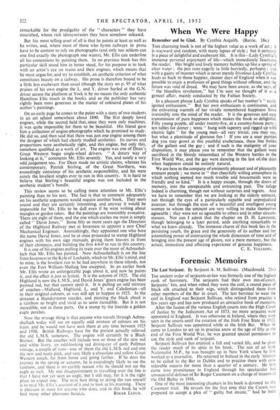When We Were Happy
Remember and be Glad. By Cynthia Asquith. (Barrie. 16s.) THIS charming book is not of the highest value as a work of art ; it is wayward and random, with many lapses of style ; but it certainly is a piece of delightful and exuberant life. It is this—Lady Cynthia's immense personal enjoyment of life—which immediately fascinates the reader. Her bright and lively memory bubbles up like a spring of clear water ; the pen runs eagerly (a little hurriedly, perhaps) ; and with a gaiety of manner which is never merely frivolous Lady Cynthia leads us back to those happier, cleaner days of England when it was possible to enjoy a profusion of good things without offence, and the future was void of dread. We may have been aware, as she says, of " the bloodless revolution," but I'm sure we thought of it as a genteel affair, mainly conducted by the Fabian Society.
In a pleasant phrase Lady Cynthia speaks of her mother's" easily ignited enthusiasm." But her own enthusiasm is continuous, and the enlivening warmth of her vividly remembered happiness flows irresistibly into the mind of the reader. It is the generous and easy transmission of pure happiness which makes the book so delightful. Fifty young people,'all under twenty-five, at a country-house party ; ten tables for dinner ; tents" hung with tapestry and rigged up with electric light " for the young men—all very trivial, you may say, but what a plentitude of glorious fun ! If you are a sour puritan dog you may growl at this youthful exuberance, these fine frolics of the gallant and the gay ; and if such is the malignity of your disposition, it may please you to remember that the .gallant were sacrificed in the bloody misconduct of the Western battles in the First World War, and the gay were dancing in the last of,the days when happiness could be entirely natural.
We are here in the company of eminently pleasant and of pleasantly eminent people ; we move in" that cheerfully willing atmosphere in which nothing seemed too much trouble and housemaids were so friendly and so kind." It is a happy escape, through the doors of memory, into the unrepeatable and entrancing past. The refuge indeed is charming, though not without surprises and regrets. And we have to remember that we are looking at the elderly eminent, not through the eyes of a particularly capable and unprejudiced assessor, but through the eyes of a beautiful and intelligent young woman to whom the eminent are very willing to make themselves agreeable ; they were not so agreeable to others and in other circum- stances. Nor can I admit that the chapter on D. H. Lawrence, though belonging to a later period, adds anything remarkable to what we knew already. The immense charm of this book lies in the persisting youth, the grace and the generosity of its author and her astonishing power of contracting the whole dimension of time and of bringing into the present age of gloom, not a mere memory, but the actual, immediate and affecting experience of genuine happiness.
C. E. VULLIAMY.


































 Previous page
Previous page